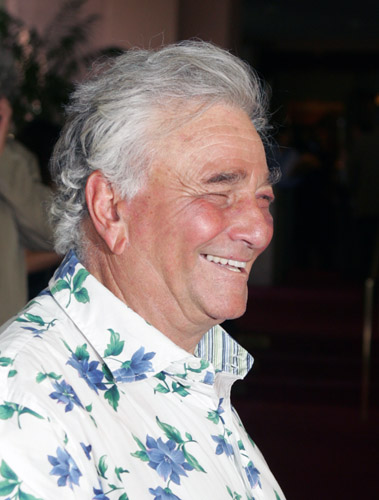
- HFPA
PETER FALK – AN APPRECIATION

The death of actor Peter Falk leaves a huge void in the film community. Although best known for playing Columbo on television (for which he won a Golden Globe), members of the Hollywood Foreign Press Association will remember him most for his beguiling wit. For the worldwide popularity of Columbo, he had an explanation. “Like all the great detectives, the character himself is interesting. Elaine May once compared Columbo to Sherlock Holmes, saying Columbo was an ass-backwards Sherlock Holmes, meaning Holmes was tall, Columbo short. Holmes had a long neck, Columbo no neck. Holmes smokes an expensive Meerschaum pipe, Columbo 25 cent cigars. Holmes is articulate, Columbo is still working on his English. What they have in common is an insatiable curiosity, and in that sense, they are like children, because what you and I take for granted, they find interesting. They’re both obsessors, obsessed with getting to the answer, totally in love with what they do. Can you imagine Columbo ever killing time?” How attached was he to the character of Columbo? “He means a great deal to me. He changed my life, made me a lot of dough. As I’ve said a number of times, I don’t think God designed anyone to be recognized by three billion people, but it’s true. Can you imagine 3 billion people know who you are? And you don’t know any of them. This is very strange.” Asked why Columbo is so proficient, he has a ready explanation. “He doesn’t talk too much. If he knows something, he doesn’t blab it right away. He keeps it to himself. Most people when they know something, they can’t wait to open their mouths. Out it comes. You never see Columbo share his information with other cops. He doesn’t trust them; he’s Italian that way. He don’t trust. Later on is time enough. He keeps it to himself.” Falk compares a good director with Columbo. “He doesn’t shoot off his mouth. The best directors wait a long time before they start talking. First they want to see. The best directors that I’ve worked with, they pick their spots before they open their mouths. They first look at the strength of the actor and work on that, rather than deciding ahead of time where they’re going to push him.” One of the highlights of Falk’s career was his role in Wim Wenders’ Wings of Desire playing himself. Here’s how he described that experience: “With Wim, you can hardly hear when he talks. And if you did, you wouldn’t understand it, so it doesn’t make any difference. Wim is in his own world, wandering around, thinking. Most of the time, he is saying ‘I’m not sure. I don’t know.’ But strangely enough, he has what I think is the essential quality for a director – he inspires confidence by being so comfortable with his uncertainty. He has no compunction about saying ‘I don’t know. I just don’t know…’ He always enumerates all his options. ‘I could do this. I could do that.’ He’ll think and think, and then he’ll say he won’t be able to sleep. But underneath he’s very confident. He told me, ‘Whenever I have a script, I want to rip it up. I feel I’m a prisoner of the script. It imposes boundaries. It tells me I have to stay here. If I see something else, I can’t do it. I want to burst out of that script. On Wings I have no script, so every night when I go to bed what do I do, I pray to God, ‘If I only had a script.’” Talking about costumes, Falk spoke about Columbo’s trenchcoat. “A costume is very important. Some mystical thing happens when you get the right costume. I don’t know why.” He segues into a story of the Wings costume. “When I went over to Berlin to do Wings of Desire, it was a different experience. On other pictures you have something to worry about because you have a script. But if you don’t have a script, what’s there to worry about? Nothing. Well, I found something to worry about — my costume. When Wim makes a movie he reminds me of Cassavetes. He would always meet at night, 3 o’clock in the morning, in a bar somewhere. He never met in an office, and you always got messages, ‘I’ll meet you here,’ and then another message would come, ‘No it’ll be an hour later, and it’ll be in the other part of town.’ Everything was done in the middle of making the movie. “Any rate, I went to get the costume. I hadn’t seen Wim, so I brought it over to the hotel and waited for him. When he got there, I started telling him the toughest thing is to find a hat, a hat that you look good in, that fits your face, the brim is not too big, the top of the brim, the boop, the bup, everything. So while I was putting it on, saying how good it looks from the front, that like this it looks like I’m going to the opera, like that I look like a rabbi, when I got done, he said, ‘I don’t know about the costume, but the scene I could use in the film, and he did.” Besides Falk’s sense of humor, there was his self deprecating candor. Asked about his published drawings, he readily admitted, “There’s a lot of bogus art around, and a lot of craziness about celebrities. I’m not complaining, but I don’t know if I’m entirely comfortable with it. Believe me, if you had drawn it, it wouldn’t be published.” On a lighter note, he loved to joke about his tempestuous (but loving) marriage. “My wife’s Italian. You know most women don’t want to tell their ages, right? They lie about it. My wife won’t tell the age of her dog. If people stop her on the street and ask her the dog’s age, she makes it five years younger. That’s only for the female dogs. The males she tells the truth right away.” What made the marriage work? “Well, you know, my wife and I decide to get divorced every three years. One of the problems of getting a divorce is you’ve got to be in sync. If it’s out of whack, it’s hard to get a divorce. As I once said, if we all pull together, we can make this divorce work.” R.I.P. Peter Falk. You will surely be missed.